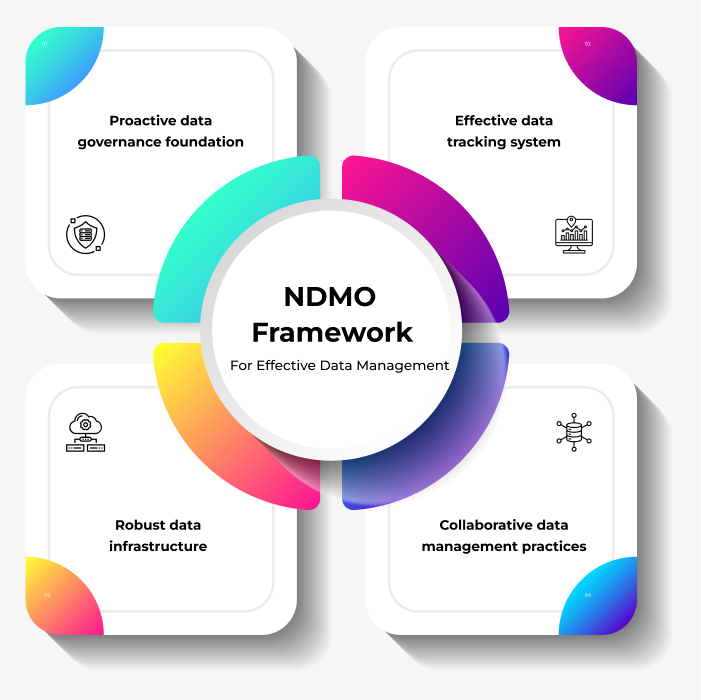Decoding NDMO Standards for Data Management: A Roadmap to Enterprise Success Through Improved Governance and Compliances
Introduction
As the importance of data governance grows, the establishment of the NDMO (National Data Management Office) framework in Saudi Arabia aims to bring clarity, consistency, and security to data management practices or businesses.
Compliance with these regulations is essential, not only to avoid penalties but to build trust with customers and stakeholders by demonstrating a strong commitment to protecting sensitive information.
Let’s explore the essential elements of NDMO standards and their impact on enterprise data management—positioning your organisation for growth and resilience in today’s data-driven world.
Why Is Data Management Important For Organisations?
- Data management offers a scalable and consistent means of handling data.
- It also minimises errors by providing clear rules for your use of data.
- Data trust empowers decision-makers to act on well-informed, confident decisions.
- This maximises data’s value, resulting in improved organisational outcomes.
Good data is vital for an organisation to run properly and efficiently. For long-lasting impacts, enterprises require a secured structure (NDMO) that does not take heavy practice, acts as compliance, and optimises data values over the enterprise in all tier levels.
Data management transforms raw data into a strategic asset, enabling organisations to unlock value, drive innovation, and make informed decisions by turning data into a valuable resource for business growth and customer engagement.”- Mike Capone, Qlik

Key Challenges that Organisations Face Before Implementing NDMO Compliance Requirements
Leading organisations struggle when applying all NDMO frameworks to manage data lifecycle and data environments compliant with evolving regulations, etc.
These issues need to be addressed by enterprises who want to lessen their data governance and compliance risk.
1. Struggling With Data Mobility
Managing to capture, store, and movement of data across multiple environments in an enterprise often leads to inefficiencies and fragmented data sources.
2. Difficulty In Identifying Sensitive Data
Identifying and classifying important and sensitive data across disparate systems is a complex data process. This process can result in the increasing risk of data breaches and non-compliance.
3. Lack Of Clear Data Ownership
Without clearly defined rights and ownership, an organisation may have confusion about who is responsible for managing and securing data, resulting in gaps in accountability.
4. Extracting Value From The Data
Organisations were able to manage data, but they seldom managed to derive value from enterprise data because they had no data management because the analytics capabilities were minimal.
5. Keeping Up With Changing Regulations
Addressing compliance with changing regulations, like the Personal Data Protection Law (PDPL), is quite difficult for enterprises. To address this effectively, organisations require continuous monitoring and adaptation to avoid legal and reputational risks.
Achieving enterprise success requires organisations to effectively handle regulatory requirements, manage compliance efficiently, and protect against data breaches. NDMO transformation helps enterprises safeguard data, uphold data subject rights, and create meaningful business value.
Let’s dive into the NDMO standards and discover how these regulatory frameworks secure data through robust security practices and unlock data’s full capabilities.
Understanding NDMO Regulatory Policy
1. What is NDMO?
NDMO stands for National Data Management Office, which is the major subordinate of the Saudi Data & AI Authority (SDAIA). It is known as a data regulator and is responsible for overseeing data management and data governance. NDMO is a regulatory policy that consists of personal data protection laws, a strict compliance framework, and a governance protocol.
2. Definition of NDMO
NDMO is a set of guidelines designed for enterprises and their business partners to manage data efficiently and securely. It helps organisations smartly use data while ensuring compliance with data regulations.
3. Objectives of the NDMO Framework in an Enterprise
- Improving Data Accuracy: The framework ensures all organisational data is reliable and consistent, enabling better decision-making and reducing errors in daily operations.
- Protecting Sensitive Details: NDMO emphasises safeguarding personal and critical business data from unauthorised access or misuse and fosters trust and security within the organisation.
- Fulfilling Legal Obligations: The framework helps businesses meet regulatory requirements, avoid legal risks, and ensure that data-handling practices align with national standards.
- Establishing Clear Data Practices: By introducing structured data governance rules, NDMO ensures organisations can effectively manage, classify, and utilise data for both operational and strategic purposes.
4. What is the NDMO Framework?
NDMO is an essential framework for both private and public sectors that helps them follow the necessary data standards to stay compliant, arrange, and secure their data management practices.
NDMO standards consist of 15 different domains in the entire data lifecycle, which are segregated into the three levels that help in reshaping the management and governance of organisational information (data).
Regardless of the sectors, the NDMO data compliance rules apply to all types of data, including physical records like paper documents, handwritten notes, emails, maps, and other forms of recorded information.
By integrating the NDMO standards precisely, organisations can
- Protect sensitive information
- Maintain data transparency
- Improve their ability to make data-driven decisions
Intriguing Information
By 2027, for example, 60% of organisations will fail to realise the anticipated value of their AI use cases due to incohesive data governance frameworks. This statistic unequivocally states that, without value-driven and compliant data governance, even the most advanced AI initiatives risk falling short.
The NDMO framework offers a structural approach to data governance, ensuring accountability and security. It enables enterprises to create simplified and centrally organised data environments that will allow AI systems to access reliable, high-quality data.
Integrating NDMO regulations paves the way for innovative AI projects that can deliver on their promised value, fostering innovation and driving sustainable business growth.

How the NDMO Standards Will Enhance Enterprise Data Protection & Integrity
The NDMO framework will undoubtedly help with compliance in data management. The main reasons for implementing the NDMO strategy are to secure enterprises’ sensitive information, ensure public trust, and govern data across the organisation.
However, the NDMO framework, including its regulatory requirements, operational implications, and alignment with an organisation’s data strategy, is a must-have option for businesses.
Let’s break down the gains of NDMO standards for enterprises.
1. Establishes A Centralised Data Framework
The NDMO framework guides organisations towards building a unified system for managing data, making it easier to access, use, and maintain accurate information across all departments.
2. Ensures Compliance With Regulations
By following NDMO guidelines, companies can align with legal requirements, reduce the risk of penalties, and maintain a trusted reputation with customers and regulators.
3. Maintains Data Integrity
By emphasising accountability and clear ownership, NDMO ensures that data remains accurate, reliable, and useful for making important decisions that drive organisational goals.
4. Breaks Down Data Silos
NDMO encourages cross-departmental collaboration by avoiding the data and human silos. It helps integrate scattered data sources, enabling seamless communication and better coordination among employees, solving important issues and achieving organisational objectives.
5. Fosters Innovation
With organised and accessible data, organisations can uncover new opportunities, experiment with fresh ideas, and develop strategies that keep them competitive in evolving markets.
6. Encourages Transparency In Data Practices
NDMO fosters transparency by guaranteeing the documentation and accessibility of data processes, thereby fostering trust among stakeholders and fostering a culture of clarity within the organisation.
7. Strengthens Data Security
NDMO prioritises the protection of sensitive information by establishing strict security measures, reducing the risk of breaches, and maintaining the confidentiality of data assets.
Achieving Business Growth through Better Governance and Compliance Strategies
After integrating NDMO frameworks, how can an enterprise achieve success through improved governance and compliance? Here’s how.
1. Maximise enterprise's data value
NDMO standards help businesses gain full access to their data using AI and business intelligence. By using Qlik Talend’s data management capabilities, enterprises can effectively manage their data, optimise its performance, and ensure compliance with security guidelines.
Let’s look in depth at how businesses optimise governance practices.
- Open Data Handling: Ensuring that the data is securely handled and shared according to the open data standards set by SDAIA, making it more accessible and transparent.
- AI-driven Insights: By using AI, businesses get valuable insights to make better decisions, reduce costs, improve operations, and create ROI.
2. Data Assetization
Turning data into valuable assets is crucial for organisations that aim to make the most of their information. By managing data properly, it becomes not just something to store but a powerful resource that drives growth.
By leveraging the Qlik Talend solution and adhering to NDMO standards, enterprises can improve their data integrity and establish a strong data governance structure.
- Data Catalogue & Metadata: Create a clear inventory of data, making it easier to track and manage across systems.
- Document and Content Management: Using Qlik Talend’s data management tools, organisations can make documents and content easier to find and use, saving time and effort.
- Data Integration: Businesses can unify scattered data from diverse sources by leveraging Qlik Talend. This process results in making the data work together and providing meaningful insights.
- Data quality: High-quality data has been a foundation for an organisation to achieve its objectives. With the help of Qlik Talend solutions, enterprises can remove data errors and redundancies, making the data clean and accurate.
- Data Operations: Simplify and organise the data process, ensuring everything runs smoothly and is under control.
- Data architecture and modelling: Companies handle complex data to ensure that the system can grow and adapt without losing efficiency. By adopting intelligent data models, enterprises can build strong and flexible data structures that adapt as the business grows.
3. Keeping Your Data Safe and Compliant
With the right strategies in place, companies can confidently navigate regulatory requirements while building trust with their customers.
- Managing Public Data: It’s important to keep public information available for everyone to see, but that doesn’t mean oversharing sensitive data.
For example, a city’s government might share information on public transportation routes, but personal data like addresses or phone numbers should stay private.
- Protecting Personal Data: When a customer shares their information, they trust the business to keep it safe. Businesses need to implement strong data systems to protect people’s privacy.
Establishing data protection frameworks guarantees the security and confidentiality of personal details.
- Classifying data Properly: Not all data is equal. Some are more sensitive and some are less. With the help of Talend’s fabric data management capabilities , companies can classify their data based on sensitivity and importance, helping to manage security and compliance effectively.
4. Data Access and Control
Strong access control ensures that only authorised personnel can access sensitive data. This practice reduces the risk of unauthorised breaches while keeping operations running smoothly and efficiently. It’s about safeguarding data access without disrupting business flow.
5. Securing Data Against Cyber Threats
Let’s say hackers target a company’s database. If the company has the right security systems in place, such as encryption, the data stays safe. By adhering to standards set by the Saudi National Cybersecurity Authority (NCA), enterprises can protect against potential data breaches, business reputation, and their customers’ trust.
6. Leadership-Driven Data Practices
Effective data management begins with clear guidance from leadership. With the help of Qlik Talend solutions for data integration, cataloging and accessibility. This makes enterprises empower teams through proper training and engagement, embedding data-centric decision-making.
7. Automate Compliance
Meeting NDMO compliance becomes manageable with automation. By replacing manual tasks, organisations maintain accuracy, reduce errors, and ensure consistent adherence to NDMO standards—fostering smoother operations and building trust in compliance efforts.
How can SquareOne help Enterprises with Effective Data management?
SquareOne is one of the prominent data management service providers in the UAE, offering wide-ranging data management solutions through Qlik Talend Master Data Management and Qlik Sense BI & Analytics.
At SquareOne, the data experts understand the regulations of NDMO regulatory policy, helping enterprises overcome compliance hurdles, process inefficiencies, and technology gaps by offering mentorship and continuous learning. This ensures a smooth journey toward effective data transformation for businesses.
The team extends its proficiency in implementing AI strategies that keep businesses ahead, ensuring transformative and sustainable outcomes that drive operational excellence and smarter decision-making.
Final Note
With the NDMO Standards, enterprises will have a new data governance and compliance model. Organisations can achieve a reliable data management framework, ensuring sensitive file protection and regulatory compliance by adhering to their norms. By implementing an NDMO model in an enterprise, the experts at SquareOne ensure a safe and secure journey following facilitated compliance.
















